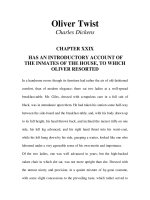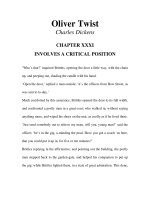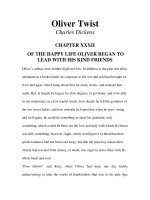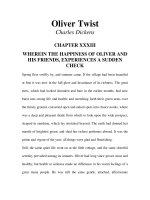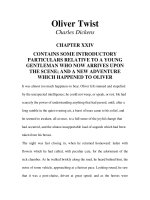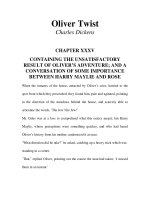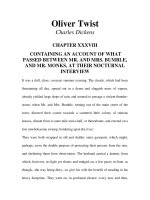Tài liệu LUYỆN ĐỌC TIẾNG ANH QUA TÁC PHẨM VĂN HỌC-Pride and Prejudice -Jane Austen -Chapter 33 docx
Bạn đang xem bản rút gọn của tài liệu. Xem và tải ngay bản đầy đủ của tài liệu tại đây (23.8 KB, 9 trang )
Pride and Prejudice
Jane Austen
Chapter 33
More than once did Elizabeth, in her ramble within the park, unexpectedly
meet Mr. Darcy. She felt all the perverseness of the mischance that should
bring him where no one else was brought, and, to prevent its ever happening
again, took care to inform him at first that it was a favourite haunt of hers.
How it could occur a second time, therefore, was very odd! Yet it did, and
even a third. It seemed like wilful ill-nature, or a voluntary penance, for on
these occasions it was not merely a few formal inquiries and an awkward
pause and then away, but he actually thought it necessary to turn back and
walk with her. He never said a great deal, nor did she give herself the trouble
of talking or of listening much; but it struck her in the course of their third
rencontre that he was asking some odd unconnected questions—about her
pleasure in being at Hunsford, her love of solitary walks, and her opinion of
Mr. and Mrs. Collins’s happiness; and that in speaking of Rosings and her
not perfectly understanding the house, he seemed to expect that whenever
she came into Kent again she would be staying THERE too. His words
seemed to imply it. Could he have Colonel Fitzwilliam in his thoughts? She
supposed, if he meant anything, he must mean and allusion to what might
arise in that quarter. It distressed her a little, and she was quite glad to find
herself at the gate in the pales opposite the Parsonage.
She was engaged one day as she walked, in perusing Jane’s last letter, and
dwelling on some passages which proved that Jane had not written in spirits,
when, instead of being again surprised by Mr. Darcy, she saw on looking up
that Colonel Fitzwilliam was meeting her. Putting away the letter
immediately and forcing a smile, she said:
‘I did not know before that you ever walked this way.’
‘I have been making the tour of the park,’ he replied, ‘as I generally do every
year, and intend to close it with a call at the Parsonage. Are you going much
farther?’
‘No, I should have turned in a moment.’
And accordingly she did turn, and they walked towards the Parsonage
together.
‘Do you certainly leave Kent on Saturday?’ said she.
‘Yes—if Darcy does not put it off again. But I am at his disposal. He
arranges the business just as he pleases.’
‘And if not able to please himself in the arrangement, he has at least pleasure
in the great power of choice. I do not know anybody who seems more to
enjoy the power of doing what he likes than Mr. Darcy.’
‘He likes to have his own way very well,’ replied Colonel Fitzwilliam. ‘But
so we all do. It is only that he has better means of having it than many
others, because he is rich, and many others are poor. I speak feelingly. A
younger son, you know, must be inured to self-denial and dependence.’
‘In my opinion, the younger son of an earl can know very little of either.
Now seriously, what have you ever known of self-denial and dependence?
When have you been prevented by want of money from going wherever you
chose, or procuring anything you had a fancy for?’
‘These are home questions—and perhaps I cannot say that I have
experienced many hardships of that nature. But in matters of greater weight,
I may suffer from want of money. Younger sons cannot marry where they
like.’
‘Unless where they like women of fortune, which I think they very often do.’
‘Our habits of expense make us too dependent, and there are too many in my
rank of life who can afford to marry without some attention to money.’
‘Is this,’ thought Elizabeth, ‘meant for me?’ and she coloured at the idea;
but, recovering herself, said in a lively tone, ‘And pray, what is the usual
price of an earl’s younger son? Unless the elder brother is very sickly, I
suppose you would not ask above fifty thousand pounds.’
He answered her in the same style, and the subject dropped. To interrupt a
silence which might make him fancy her affected with what had passed, she
soon afterwards said:
‘I imagine your cousin brought you down with him chiefly for the sake of
having someone at his disposal. I wonder he does not marry, to secure a
lasting convenience of that kind. But, perhaps, his sister does as well for the
present, and, as she is under his sole care, he may do what he likes with her.’
‘No,’ said Colonel Fitzwilliam, ‘that is an advantage which he must divide
with me. I am joined with him in the guardianship of Miss Darcy.’
‘Are you indeed? And pray what sort of guardians do you make? Does your
charge give you much trouble? Young ladies of her age are sometimes a
little difficult to manage, and if she has the true Darcy spirit, she may like to
have her own way.’
As she spoke she observed him looking at her earnestly; and the manner in
which he immediately asked her why she supposed Miss Darcy likely to
give them any uneasiness, convinced her that she had somehow or other got
pretty near the truth. She directly replied:
‘You need not be frightened. I never heard any harm of her; and I dare say
she is one of the most tractable creatures in the world. She is a very great
favourite with some ladies of my acquaintance, Mrs. Hurst and Miss
Bingley. I think I have heard you say that you know them.’
‘I know them a little. Their brother is a pleasant gentlemanlike man—he is a
great friend of Darcy’s.’
‘Oh! yes,’ said Elizabeth drily; ‘Mr. Darcy is uncommonly kind to Mr.
Bingley, and takes a prodigious deal of care of him.’
‘Care of him! Yes, I really believe Darcy DOES take care of him in those
points where he most wants care. From something that he told me in our
journey hither, I have reason to think Bingley very much indebted to him.
But I ought to beg his pardon, for I have no right to suppose that Bingley
was the person meant. It was all conjecture.’
‘What is it you mean?’
‘It is a circumstance which Darcy could not wish to be generally known,
because if it were to get round to the lady’s family, it would be an
unpleasant thing.’
You may depend upon my not mentioning it.’
‘And remember that I have not much reason for supposing it to be Bingley.
What he told me was merely this: that he congratulated himself on having

